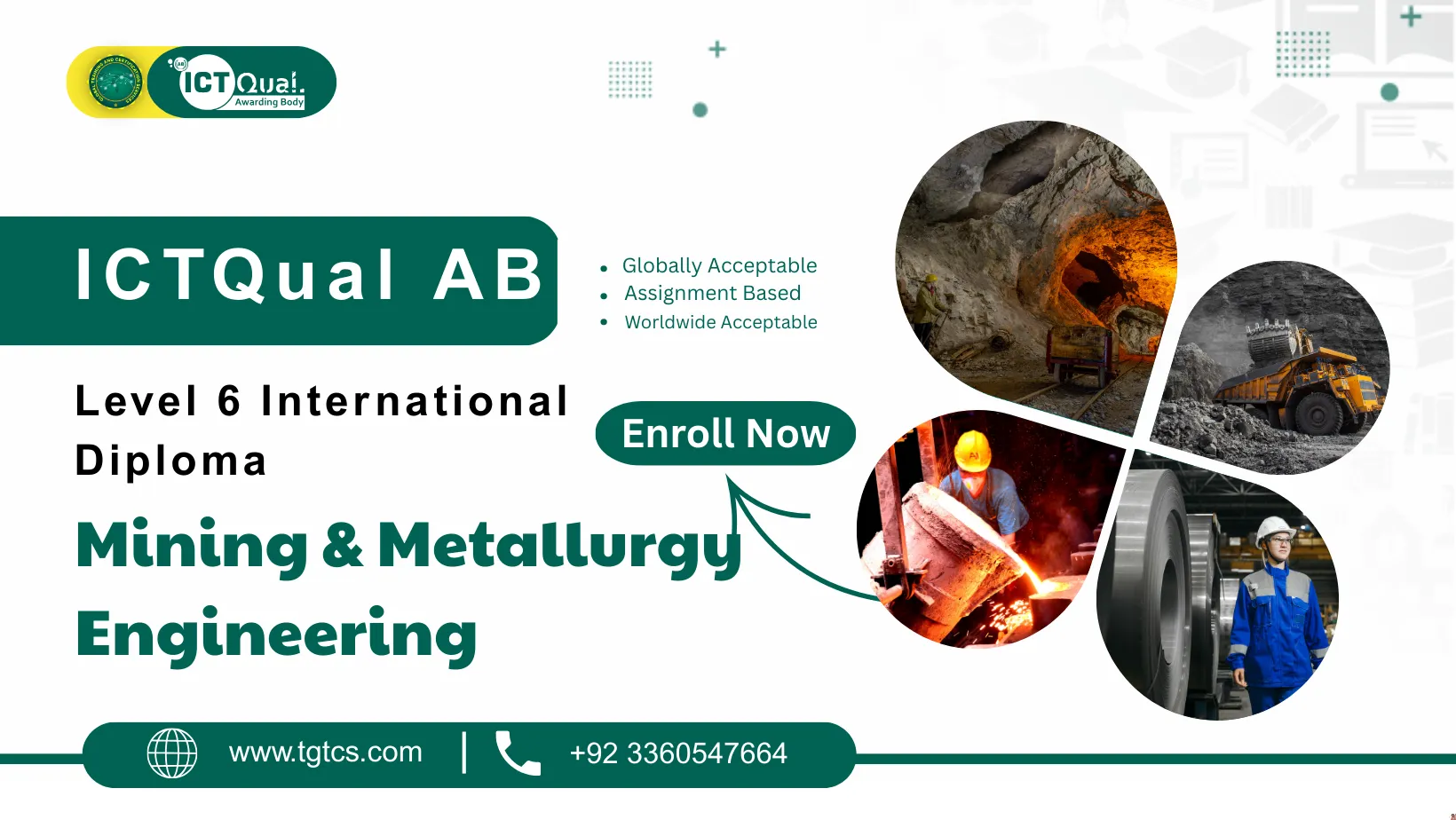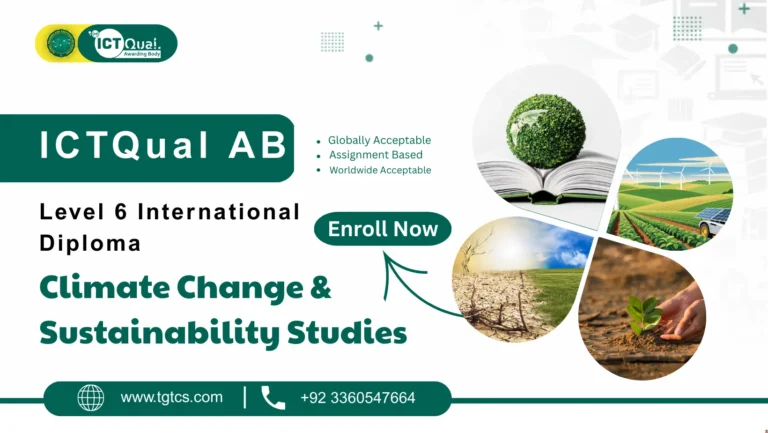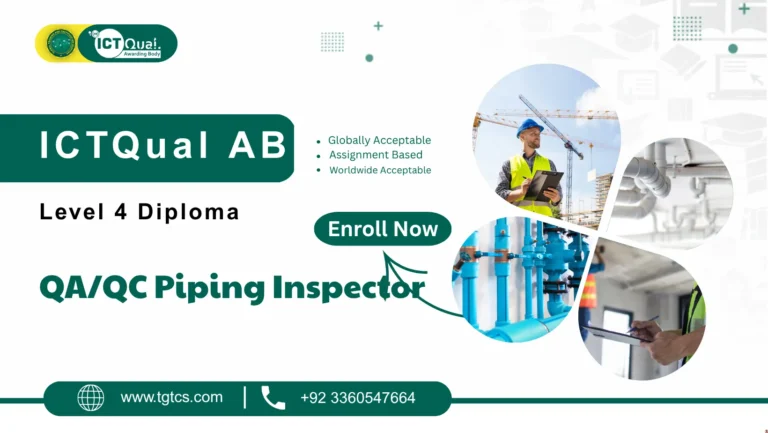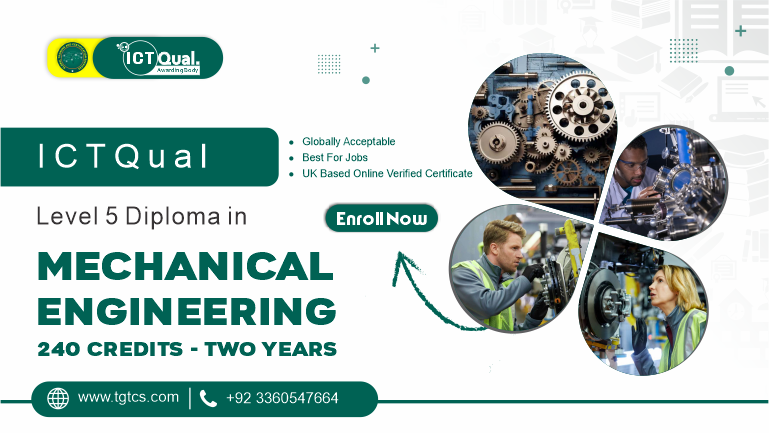ICTQual AB Level 6 International Diploma in Mining & Metallurgy Engineering
The ICTQual AB Level 6 International Diploma in Welding & Fabrication Technology is a globally recognized qualification designed to meet the growing demand for skilled professionals in welding, fabrication, and advanced manufacturing industries. With industries such as oil & gas, construction, automotive, shipbuilding, and energy heavily reliant on welding and fabrication expertise, this diploma equips learners with the technical knowledge and practical skills required to excel in competitive global markets.
This comprehensive program provides in-depth learning of welding techniques, fabrication processes, welding metallurgy, safety practices, quality assurance, and project management. Learners will also gain expertise in structural welding, pipe welding, robotic welding, and fabrication design, making them fully prepared to handle complex engineering challenges.
The course is structured to balance both theoretical knowledge and practical applications, ensuring learners not only understand the science of welding and metallurgy but can also apply it effectively in real-world industrial scenarios. Delivered through a flexible, assignment-based mode of study, the program is accessible worldwide, making it ideal for working professionals and fresh learners seeking to advance their careers at their own pace.
Graduates of this diploma will be equipped with the skills to take on roles such as welding engineers, fabrication supervisors, quality inspectors, project managers, and industry leaders. As the qualification is British Council verifiable, MOFA and Embassy attested, it opens global career opportunities and enhances employability in international markets, including Gulf countries where iqama approval is essential.
The Global Training and Certification Services is Approved Training Centre of ICTQual AB UK Ltd
The ICTQual AB Level 6 International Diploma in Mining & Metallurgy Engineering is a prestigious and globally recognized qualification designed for individuals aiming to build strong expertise in the fields of mining operations, mineral processing, metallurgy, and resource management.
Course Level and Credits
- Level 6 International Diploma, 360 credits.
- Suitable for engineers, technicians, and students pursuing advanced mining and metallurgy knowledge.
Mode of Study
- Fully assignment-based; complete at your own pace.
- Accessible globally, offering flexibility for working professionals.
Global Recognition & Attestation
- British Council verifiable, MOFA and Embassy attested.
- Recognized for employment, career advancement, and iqama approval in Gulf countries.
Scope and Purpose
- Comprehensive coverage of mining engineering, mineral processing, metallurgy, and sustainable resource practices.
- Focused on both theoretical principles and real-world industrial applications.
Skills and Knowledge Gained
- Mining operations, ore extraction techniques, mineral processing, and metallurgical methods.
- Advanced project planning, safety standards, risk assessment, and sustainable engineering practices.
Career Benefits
- Opens pathways to careers as mining engineers, metallurgists, project managers, safety officers, and plant supervisors.
- Enhances global employability and professional credibility in energy, construction, and resource-based industries.
Target Audience
- Fresh learners aiming for careers in mining and metallurgy engineering.
- Experienced professionals seeking international certification and career growth.
Unique Pathways for Learners
- Fresh students: Complete 36 mandatory assignments within 3 years.
- Experienced professionals: Gain the diploma through recognition of prior learning by submitting at least 6 years of verifiable experience and defending knowledge in a professional discussion with an ICTQual AB-approved assessor.
The ICTQual AB Level 6 International Diploma in Mining & Metallurgy Engineering provides a flexible and internationally attested pathway for learners at all levels.
Mandatory Unit
This qualification, the ICTQual AB Level 6 International Diploma in Mining & Metallurgy Engineering, consists of 36 mandatory units.
Year 1 – Foundation in Mining & Metallurgy Engineering
- Principles of Mining and Metallurgy Engineering
- Engineering Mathematics
- Fundamentals of Mechanical and Electrical Engineering
- Materials Science and Metallurgy
- Engineering Drawing and Computer-Aided Design (CAD)
- Introduction to Mining Geology and Mineralogy
- Basics of Mining Operations and Techniques
- Fundamentals of Ore Processing and Metallurgical Methods
- Health, Safety, and Environmental Practices in Mining
- Introduction to Mining Equipment and Machinery
- Communication and Technical Report Writing
- Introduction to Project Management in Engineering
Year 2 – Intermediate Studies in Mining & Metallurgy Engineering
- Mining Methods and Mine Planning
- Mineral Processing and Extractive Metallurgy
- Rock Mechanics and Geotechnical Engineering
- Advanced Materials and Metallurgical Analysis
- Industrial Automation and Control Systems in Mining
- Mine Surveying and Geomatics Applications
- Industrial Maintenance and Reliability in Mining Operations
- Sustainable Mining Practices and Environmental Management
- Applied Research Methods in Mining and Metallurgy
- Mining Economics and Cost Control
- Project Planning and Mine Operations Management
- Health, Safety, and Risk Management in Metallurgy
Year 3 – Advanced Studies in Mining & Metallurgy Engineering
- Advanced Mining Techniques and Underground Operations
- Advanced Metallurgical Processes and Simulation
- Mineral Resource Evaluation and Optimisation
- Mine Ventilation and Environmental Control Systems
- Smart Mining Technologies and Industry 4.0 Applications
- Robotics and Automation in Mining and Metallurgy
- Cyber-Physical Systems and IoT in Mining Operations
- Professional Ethics and Sustainability in Mining Engineering
- Innovation and Entrepreneurship in Mining & Metallurgy
- Infrastructure and Facility Planning for Mining Projects
- Advanced Research and Analytical Techniques in Metallurgy
- Final Year Major Project (Capstone Project)
The ICTQual AB Level 6 International Diploma in Mining & Metallurgy Engineering is designed to provide learners with strong technical foundations, practical problem-solving abilities, and advanced industry knowledge.
Year 1 – Foundation in Mining & Metallurgy Engineering
Principles of Mining and Metallurgy Engineering
- Understand the scope, principles, and importance of mining and metallurgy.
- Explain the relationship between mining operations and metallurgical processes.
- Identify the key stages of mineral extraction and processing.
- Apply fundamental engineering knowledge to solve basic mining problems.
Engineering Mathematics
- Apply mathematical principles to solve mining and metallurgy engineering problems.
- Use calculus, algebra, and statistics in engineering contexts.
- Interpret technical data and perform quantitative analysis.
- Develop problem-solving skills for engineering design and operations.
Fundamentals of Mechanical and Electrical Engineering
- Explain the basic principles of mechanical and electrical systems used in mining.
- Identify and describe common machines and electrical equipment in mining sites.
- Apply mechanical and electrical concepts to engineering challenges.
- Ensure safe operation and maintenance of mining equipment.
Materials Science and Metallurgy
- Understand the properties, structures, and classifications of engineering materials.
- Analyze the physical and chemical properties of metals and alloys.
- Relate metallurgical processes to material performance in mining applications.
- Apply materials science knowledge to improve fabrication and production.
Engineering Drawing and Computer-Aided Design (CAD)
- Develop technical drawings for mining and metallurgical applications.
- Use CAD software to create precise engineering designs.
- Interpret engineering drawings and translate them into practical applications.
- Apply design standards and practices to industrial projects.
Introduction to Mining Geology and Mineralogy
- Understand the role of geology and mineralogy in mining engineering.
- Identify common minerals and rocks relevant to mining operations.
- Apply geological data for mineral exploration and mine planning.
- Evaluate geological hazards and their impact on mining.
Basics of Mining Operations and Techniques
- Describe surface and underground mining methods.
- Understand the stages of mine development and operation.
- Apply safe practices in basic mining techniques.
- Identify the equipment and manpower required for different mining methods.
Fundamentals of Ore Processing and Metallurgical Methods
- Explain the processes involved in ore beneficiation and extraction.
- Identify key metallurgical methods such as smelting and refining.
- Apply ore processing techniques to different types of minerals.
- Evaluate efficiency and sustainability of metallurgical operations.
Health, Safety, and Environmental Practices in Mining
- Understand health and safety regulations in mining and metallurgy.
- Apply risk management practices in mining operations.
- Promote environmental sustainability in resource extraction.
- Implement emergency response measures in mining projects.
Introduction to Mining Equipment and Machinery
- Identify common mining machines and their functions.
- Explain the role of heavy machinery in excavation and processing.
- Apply principles of machinery operation and maintenance.
- Assess equipment safety and performance in mining.
Communication and Technical Report Writing
- Develop professional technical reports for mining projects.
- Communicate technical data effectively to stakeholders.
- Apply industry-specific writing standards in documentation.
- Present complex engineering information in clear and concise formats.
Introduction to Project Management in Engineering
- Understand project management principles in mining and metallurgy.
- Apply planning and scheduling tools to mining projects.
- Monitor and control project resources effectively.
- Evaluate risks and implement solutions in project execution.
Year 2 – Intermediate Studies in Mining & Metallurgy Engineering
Mining Methods and Mine Planning
- Differentiate between surface, underground, and hybrid mining methods.
- Apply planning tools for mine design and production scheduling.
- Evaluate the economic feasibility of mining operations.
- Integrate safety and environmental considerations into mine planning.
Mineral Processing and Extractive Metallurgy
- Understand physical and chemical mineral processing methods.
- Apply extractive techniques such as leaching, smelting, and electrolysis.
- Evaluate efficiency and yield of mineral processing operations.
- Optimize processes for cost-effectiveness and sustainability.
Rock Mechanics and Geotechnical Engineering
- Analyze the mechanical behavior of rocks in mining environments.
- Apply geotechnical methods for slope stability and ground support.
- Evaluate risks related to rock falls and subsidence.
- Use geotechnical data in mine design and safety planning.
Advanced Materials and Metallurgical Analysis
- Apply metallurgical testing and characterization techniques.
- Analyze physical, thermal, and mechanical properties of metals.
- Evaluate microstructures for industrial applications.
- Recommend material selection for different mining environments.
Industrial Automation and Control Systems in Mining
- Understand automation technologies used in mining operations.
- Apply control systems for efficient production and safety.
- Evaluate the role of SCADA, PLCs, and robotics in mining.
- Integrate automation for cost savings and improved productivity.
Mine Surveying and Geomatics Applications
- Apply surveying principles in mine planning and operations.
- Use modern geomatics tools such as GIS and remote sensing.
- Interpret survey data for resource estimation and safety.
- Conduct precision measurements for underground and surface mining.
Industrial Maintenance and Reliability in Mining Operations
- Apply preventive and predictive maintenance strategies.
- Evaluate equipment reliability and performance indicators.
- Develop maintenance schedules for critical machinery.
- Implement reliability engineering in mining operations.
Sustainable Mining Practices and Environmental Management
- Apply sustainability principles in mining and metallurgy.
- Evaluate environmental impacts of resource extraction.
- Implement waste management and pollution control measures.
- Integrate renewable energy and green technologies into mining.
Applied Research Methods in Mining and Metallurgy
- Understand the role of applied research in engineering.
- Design and conduct industry-focused research projects.
- Analyze and interpret experimental data effectively.
- Apply research findings to solve practical industry challenges.
Mining Economics and Cost Control
- Apply principles of mining economics to project evaluation.
- Understand cost structures in mining and metallurgy.
- Use financial models to assess profitability and risks.
- Develop strategies for cost optimization and value creation.
Project Planning and Mine Operations Management
- Apply project management methodologies in mining operations.
- Monitor and control production performance indicators.
- Allocate resources efficiently in mine operations.
- Implement quality control and operational excellence.
Health, Safety, and Risk Management in Metallurgy
- Identify hazards and risks in metallurgical processes.
- Apply risk management frameworks in industrial operations.
- Implement occupational safety standards and best practices.
- Develop emergency preparedness and safety response plans.
Year 3 – Advanced Studies in Mining & Metallurgy Engineering
Advanced Mining Techniques and Underground Operations
- Apply advanced drilling, blasting, and tunneling methods.
- Evaluate deep mining challenges and solutions.
- Integrate automation into underground mining operations.
- Ensure safety and efficiency in advanced mining projects.
Advanced Metallurgical Processes and Simulation
- Apply advanced refining and alloy production techniques.
- Use simulation tools to model metallurgical processes.
- Optimize smelting, casting, and heat treatment methods.
- Evaluate innovations in extractive metallurgy.
Mineral Resource Evaluation and Optimisation
- Apply resource estimation techniques and classification standards.
- Use geostatistics for resource modeling and evaluation.
- Optimize extraction plans to maximize recovery.
- Assess resource potential for long-term profitability.
Mine Ventilation and Environmental Control Systems
- Understand principles of mine ventilation and air circulation.
- Apply ventilation systems to control dust, gas, and temperature.
- Implement environmental monitoring systems.
- Design energy-efficient ventilation strategies.
Smart Mining Technologies and Industry 4.0 Applications
- Explore applications of digital twins and smart mining solutions.
- Apply IoT, AI, and data analytics in mining operations.
- Evaluate the role of predictive maintenance in Industry 4.0.
- Integrate smart mining for sustainable production.
Robotics and Automation in Mining and Metallurgy
- Apply robotic systems in drilling, blasting, and processing.
- Integrate automation for efficiency and worker safety.
- Evaluate the cost-benefit of robotics in mining.
- Develop strategies for digital transformation in mining.
Cyber-Physical Systems and IoT in Mining Operations
- Understand applications of CPS and IoT in mining environments.
- Apply real-time monitoring and data-driven decision-making.
- Evaluate cybersecurity challenges in mining operations.
- Integrate IoT for productivity, safety, and environmental performance.
Professional Ethics and Sustainability in Mining Engineering
- Understand ethical issues in global mining industries.
- Apply professional codes of conduct in engineering practice.
- Promote sustainability and social responsibility.
- Integrate ethical decision-making in engineering projects.
Innovation and Entrepreneurship in Mining & Metallurgy
- Identify opportunities for innovation in mining technologies.
- Apply entrepreneurial skills to resource-based industries.
- Develop business models for mining and metallurgy ventures.
- Evaluate risks and opportunities in new mining markets.
Infrastructure and Facility Planning for Mining Projects
- Apply engineering design principles to mining infrastructure.
- Plan facilities such as transport systems, processing plants, and waste management.
- Ensure safety, durability, and cost-efficiency in infrastructure.
- Integrate environmental and community considerations.
Advanced Research and Analytical Techniques in Metallurgy
- Apply advanced analytical tools such as XRD, SEM, and spectroscopy.
- Conduct experimental research in metallurgy.
- Evaluate research data for industrial applications.
- Innovate metallurgical processes through applied research.
Final Year Major Project (Capstone Project)
- Identify and define a real-world problem in mining or metallurgy.
- Apply multidisciplinary knowledge to develop solutions.
- Conduct independent research and present technical findings.
- Demonstrate professional competency in mining and metallurgy.
The ICTQual AB Level 6 International Diploma in Mining & Metallurgy Engineering is designed to empower learners with advanced technical expertise, industry-relevant knowledge, and globally recognized qualifications that open doors to international career opportunities.
Global Recognition and Career Advancement
- British Council verifiable, MOFA and Embassy attested qualification.
- Recognized for job opportunities and iqama approval in Gulf countries.
- Enhances professional credibility in mining, metallurgy, and engineering fields.
- Opens pathways to senior roles in multinational corporations and global industries.
Flexible and Accessible Learning Pathway
- 100% assignment-based program, study at your own pace.
- Accessible online from anywhere in the world.
- Ideal for both working professionals and fresh learners.
- Recognition of prior learning (RPL) available for experienced candidates.
Comprehensive Technical and Practical Knowledge
- In-depth understanding of mining methods, metallurgical processes, and mineral resource evaluation.
- Hands-on application of automation, robotics, and Industry 4.0 technologies.
- Strong foundation in health, safety, and environmental management.
- Capstone project to demonstrate practical expertise in real-world scenarios.
Skills for Leadership and Innovation
- Develop advanced problem-solving and decision-making skills.
- Gain expertise in project management, cost estimation, and resource planning.
- Learn innovation and entrepreneurship in mining and metallurgy.
- Build leadership qualities for managing large-scale industrial projects.
Enhanced Employability Across Industries
- Opportunities in mining corporations, metallurgy plants, research, and consultancy.
- Skills applicable in global supply chains, smart mining technologies, and sustainable development.
- Prepares candidates for roles in management, technical supervision, and advanced engineering.
- Strong employability in Gulf, African, and Asian mining sectors.
The ICTQual AB Level 6 International Diploma in Mining & Metallurgy Engineering is more than just a qualification—it is a career-transforming opportunity.
The ICTQual AB Level 6 International Diploma in Mining & Metallurgy Engineering is designed for individuals aiming to build or advance their careers in the global mining and metallurgy industry.
Fresh Graduates Seeking Global Opportunities
- Gain strong foundational knowledge in mining operations, metallurgy, and engineering practices.
- Enhance employability with a globally recognized qualification verified by British Council and attested by MOFA and embassies.
Experienced Mining Professionals
- Showcase prior industry experience through recognition of prior learning (RPL).
- Advance to senior roles by validating skills with an internationally respected diploma.
Engineers and Technical Specialists
- Strengthen expertise in advanced metallurgical processes, robotics, automation, and Industry 4.0 applications.
- Acquire leadership and project management skills to handle complex mining projects.
Career Changers and Aspiring Professionals
- Transition into the mining and metallurgy sector with comprehensive technical and practical knowledge.
- Access international job markets with a diploma recognized for iqama approval and global employment.
Researchers and Academics in Mining Studies
- Build advanced research and analytical skills through applied projects and case studies.
- Contribute to innovation, sustainable mining practices, and technological advancement in the field.
The ICTQual AB Level 6 International Diploma in Mining & Metallurgy Engineering is suitable for a wide range of learners, from fresh graduates to seasoned industry experts.
Course Overview
Course Level
Level 6
Course Units
36 Units
Credits
360
Duration
3 years






